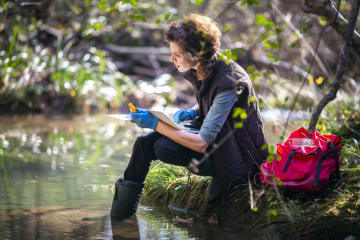How To Be Sustainable as a College Student

Just as Christ calls on us to be kind to our neighbors, we are also charged with being faithful and responsible stewards of the world he gave us. Learning how to be sustainable as a college student is an important first step toward making a positive impact.
In This Article:
College Sustainability
There’s a lot to figure out in college — from navigating course schedules and making new friends to figuring out which coffee shop in the area has the best hot brews. It's perfectly fine if you change your habits gradually instead of all at once. Focus on making smart choices on a daily basis, and gradually, those choices will turn into sustainable living habits.
Choose Secondhand Dorm Décor
Start your quest to reduce your college carbon footprint with a more sustainable dorm room. First, consider renting certain items together with your roommates. For example, many companies rent combination mini fridges/microwaves to college students.
Next, check local thrift shops and garage sales for secondhand items for your dorm room or apartment. You might even be able to find some useful items for free or at a low cost from other students around campus.
Renting and buying items secondhand are both great choices for a more sustainable lifestyle because they reduce the amount of resources used to produce new goods. Plus, they prevent unwanted items from ending up in a landfill.
Keep a Recycling Bin in Your Dorm
One essential item for your dorm room is a designated receptacle for recycling. If you don’t have a lot of free space, your “recycling bin” could simply be a tote bag hanging in the closet. Get into the habit of placing all recyclable items in there and encourage your roommates to follow suit. Be sure to identify an appropriate place on or near campus to bring your items for recycling.
Reduce Your Water Usage
Only 1% of Earth’s water is usable freshwater.1 Water is a precious resource everywhere, but here at Grand Canyon University, it’s particularly important to conserve water. Our desert climate here in Arizona receives fewer than 10 inches of rain each year, so most of the water we use must be pumped in from the Colorado River.1
Unfortunately, scientists have documented that the Colorado River Basin has lost more than 40 trillion liters of water over the last couple of decades due to climate change.2 Clearly, water conservation is particularly important in desert areas.
Make smart choices to reduce your water usage as much as possible. The following are some examples of habits that can reduce your water consumption:
- Turn off the water while brushing your teeth.
- Try to take shorter showers.
- Do laundry only when you have a full load (and use cold water to reduce energy consumption).
- Report dripping faucets to the appropriate campus authority.
Use Reusable Items Whenever Possible
During 2018, Americans alone generated about 292.4 million tons of municipal solid waste — about 4.9 pounds of trash for each person each day.3 Only about 32% of that waste was either recycled or composted.3
Even though landfills are necessary (the U.S. has about 3,000 active landfills and 10,000 closed ones), they have significant effects on our environment.4 They release significant amounts of methane gas, which is a powerful greenhouse gas that drives climate change. Landfills also destroy natural habitats, have the potential to contaminate nearby water sources and, due to ammonia leakage, can even create “dead zones” where plant and animal life cannot survive.4
Better college sustainability necessitates reducing consumption and trash production whenever possible. For example, invest in a reusable water bottle and carry it around with you instead of buying water bottles (you’ll also save money). If you’re a coffee or tea drinker, use a travel mug instead of buying coffee in disposable cups. Add creamer to the mug first and then pour coffee so you don’t have to use a plastic stirrer.
Choose Less Wasteful Transportation Methods
Motor vehicles are major contributors to climate change. Of the total greenhouse gas emissions for 2022 from the U.S., transportation accounted for 28% — the largest single category.5
College campuses are like little towns — you can often get everything you need right there. When you do need to leave campus, try to use public transportation when available. You might also consider using a bicycle while on campus, or if you’re going off campus, consider asking some friends to carpool with you.
Reduce Your Paper Usage for Better College Sustainability
There’s a lot of paper waste on college campuses — from term papers to syllabi. Look for ways to reduce your paper usage as much as possible. For example, bring your laptop to class and type your notes, and ask your professors whether you can submit assignments digitally. When you do use paper, try to use paper made from recycled products.
Reduce Your College Carbon Footprint by Unplugging
Another way to embrace sustainable living in college is to get into the habit of unplugging your electronics when you’re not using them. Even when they’re not in use, electronics that are plugged in use small amounts of electricity.
Consider keeping all items that use electricity — from your charger to your coffee pot —plugged into a power strip. Simply flip the switch when you’re ready to leave in the morning.
Be Mindful of Your Clothing Choices
It’s natural to want to be fashionable on a college campus. Plus, now is the time when you’ll also need to buy some office clothes to wear when applying to internships. Be aware, however, that the fashion industry is the second-largest consumer of our precious water resources. It also contributes to up to 8% of carbon emissions globally. Furthermore, about 85% of textiles ultimately end up in landfills.6
Try to buy as many of your clothes as possible secondhand at thrift stores or garage sales. You might also arrange a visit to the thrift shop with your new friends on campus. When you do buy new clothes, try to buy from a brand rated as “sustainable.”
Pursue Your Degree Online or on Campus at GCU
As a Christian university, GCU encourages our students, faculty and staff members to serve as responsible stewards of the Earth God gave us and charged us with protecting for future generations. In addition to our on-campus degrees, GCU offers a wide range of online degree programs, which may help reduce pollution by eliminating the need to commute to campus. Learn more today about our degree programs and our learning community by filling out the form on this page.
1 Central Arizona Project. (n.d.). The Importance of Water Conservation in AZ. CAP. Retrieved Aug. 23, 2024.
2 Bass, B., Goldenson, N., Rahimi, S. & Hall, A. (2023, July 24). Colorado River Basin Has Lost Water Equal to Lake Mead Due to Climate Change. AGU. Retrieved Aug. 23, 2024.
3 U.S. Environmental Protection Agency. (2023, Nov. 22). National Overview: Facts and Figures on Materials, Wastes and Recycling. EPA. Retrieved Aug. 23, 2024.
4 Vasarhelyi, K. (2021, April 15). The Hidden Damage of Landfills. University of Colorado Boulder. Retrieved Aug. 23, 2024.
5 U.S. Environmental Protection Agency. (2024, June 18). Fast Facts on Transportation Greenhouse Gas Emissions. EPA. Retrieved Aug. 23, 2024.
6 Geneva Environment Network. (n.d.). Environmental Sustainability in the Fashion Industry Retrieved Aug. 23, 2024.
Approved and verified accurate by the assistant vice president of GCU marketing on Oct. 14, 2024.
The views and opinions expressed in this article are those of the author’s and do not necessarily reflect the official policy or position of Grand Canyon University. Any sources cited were accurate as of the publish date.


